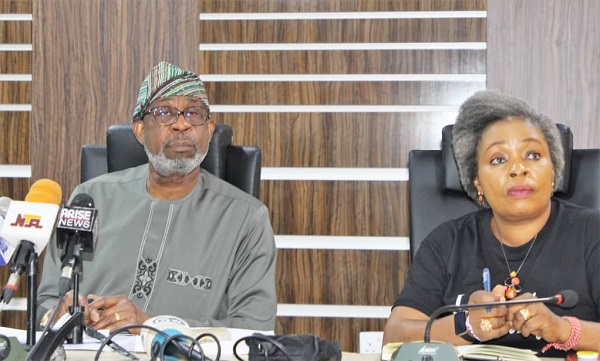
In a groundbreaking announcement, the Minister of Solid Minerals, Mr. Dele Alake declared that the ministry is poised to contribute at least 50 per cent to Nigeria’s economy.
Alake emphasised the ministry’s commitment to attracting foreign direct investment to the country. Speaking during the unveiling of the ‘Agenda for the Transformation of Solid Minerals for International Competitiveness and Domestic Prosperity’ in Abuja yesterday, the minister outlined a comprehensive seven-point agenda.
This ambitious agenda encompasses the creation of the Nigerian Solid Minerals Corporation, forging joint ventures with mining multinationals, harnessing big data on seven priority minerals and their deposits, granting a 30-day ‘grace’ period for illegal miners to join artisanal cooperatives, establishing mines surveillance task forces and mine police, conducting a thorough review of all mining licenses and initiating the establishment of six mineral processing centres focused on value-added products.
Alake underscored the importance of President Bola Tinubu’s transformative policies, such as the removal of subsidies and the adoption of a single exchange rate, in resetting the Nigerian economy’s trajectory. He stressed that the ministry needed to implement a paradigm shift to unlock the vast potential of the country’s trillion-dollar mineral resources.
Regarding the creation of the Nigerian Solid Minerals Corporation, the minister asserted that mining was a significant industry with the potential for immense profits. He insisted that Nigeria establish a corporate entity similar to its strategic position in the petroleum sector. Consequently, the ministry aims to incorporate the Nigerian Solid Minerals Corporation. This corporation will have subsidiaries specialised in the seven priority areas, including gold, coal, limestone, bitumen, lead, iron-ore and baryte. Existing enterprises like the National Iron-Ore Company and ongoing programmes like the Bitumen Concessioning Programme will be reviewed to align with this new system.
The proposed corporation will actively seek partnership investment agreements with major multinational companies worldwide. Leveraging the favourable investment climate in Nigeria, it aims to secure significant foreign direct investment for the mining sector. The national corporation will act as a guarantor and protector of these partnership agreements, enhancing partner confidence. Furthermore, the Solid Minerals Corporation will support Nigerian entrepreneurs seeking foreign funding and facilitate investment proposals. Domestically, it will engage the Nigerian financial system to establish a fund for mining investments with mutually agreed-upon interest rates.
Alake also highlighted Nigeria’s vast mineral wealth, including gold, manganese, bitumen, lithium, iron ore, lead, zinc, limestone, uranium, columbite, barite, kaolin, gemstones, coal, topaz and copper. These resources present an attractive proposition for investors.
Nigeria boasts substantial reserves, including gold (1 million ounces), limestone (568 metric tonnes), lead/zinc, (baryte (15 million metric tonnes), bitumen (N1.1 billion barrels), iron ore (3 billion metric tonnes) and coal (N396 million). With over 2 million operators, including 633 small-scale companies and 251,500 registered miners, this sector holds enormous potential.
The ministry’s deputy director of press, Alaba Balogun, further explained that the ministry plans to combat illegal mining and smuggling by introducing security task force and mines police.
Alake firmly declared that individuals involved in illegal mining would be given a 30-day grace period to join miners’ cooperatives or seek alternative livelihoods. After this grace period expires, strict legal measures will be enforced against anyone found on a mining site without a determinable status. To ensure widespread awareness of this directive, the message will be translated into various Nigerian languages and broadcast on the radio.
Starting in October, a rejuvenated security regime will come into effect in the solid minerals sector. This regime will include mine police, drawn from the Nigeria Police Force, specially trained to identify illegal mining activities and apprehend offenders. The new Mines Surveillance Security Task Force will coordinate the activities of the mines’ police and proactively address high-risk incidents of mining law violations. Both the Federal and state governments will be encouraged to prosecute cases against illegal miners in competent courts.
Addressing the ministry’s focus areas for sector improvement, Minister Alake acknowledged several factors hindering progress. These include inefficient geo-data, weak implementation and enforcement, inadequate environmental, safety, and health policies, conflicts and instability, unregulated artisanal mining, limited technical capacity, restricted access to financing, weak inter-governmental and inter-agency coordination and fragile federal/state relations.


